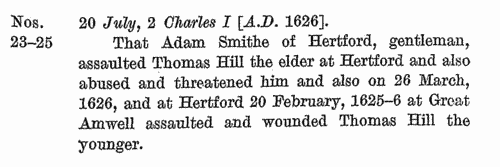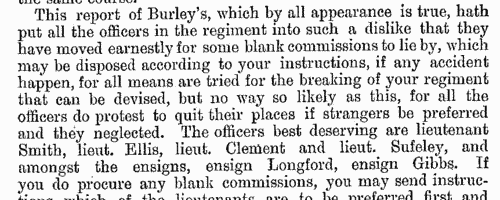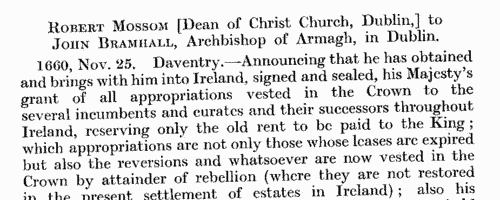Add this eBook to your basket to receive access to all 1,073 records. Our indexes include entries for the spelling hoare. In the period you have requested, we have the following 1,073 records (displaying 21 to 30): These sample scans are from the original record. You will get scans of the full pages or articles where the surname you searched for has been found. Your web browser may prevent the sample windows from opening; in this case please change your browser settings to allow pop-up windows from this site. PCC Probate Abstracts
(1650-1651)
The Prerogative Court of Canterbury's main jurisdiction was central and southern England and Wales, as well as over sailors &c dying abroad: these brief abstracts usually give address, date of probate and name of executor or administrator
| Sample scan, click to enlarge

| Hertfordshire Sessions
(1619-1657)
Incidents from the Hertfordshire Sessions Books and Sessions Minute Books. These cover a wide range of criminal and civil business for the county. | Sample scan, click to enlarge

| Official Papers
(1656-1657)
The State Papers Domestic cover all manner of business relating to Britain, Ireland and the colonies, conducted by the Council of State, as well as other miscellaneous records. These records are from July 1656 to May 1657.
| Sample scan, click to enlarge

| London Marriage Allegations
(1611-1660)
London, Essex and part of Hertfordshire lay within the diocese of London. In the later 17th century the individual archdeaconry courts issued marriage licences, but for this period the only surviving material is from the overarching London Consistory court. The main series of marriage allegations from the consistory court was extracted by Colonel Joseph Lemuel Chester, and the text was edited by George J. Armytage and published by the Harleian Society in 1887. A typical later entry will give date; name, address and occupation of groom; name, address and condition of his intended bride, and/or, where she is a spinster, her father's name, address and occupation. Lastly we have the name of the church where the wedding was going to take place. For the later years Colonel Chester merely picked out items that he thought were of interest, and his selections continue as late as 1828, but the bulk of the licences abstracted here are from the 17th century. | Sample scan, click to enlarge

| Letters and papers of James first duke of Ormond, Lord Deputy of Ireland
(1632-1660)
This correspondence deals with a large variety of personal and public affairs in Ireland and England. There is also a handful of material dating back as early as 1572. | Sample scan, click to enlarge

| Surrey Sessions
(1659-1661)
Surrey Sessions Rolls and Order Books. These are abstracts of sessional orders, minutes of criminal cases, memoranda and other entries of record taken from the Order Books from Midsummer 1659 to Midsummer 1661, inclusive, and the Sessions Rolls for Easter and Midsummer 1661. | Sample scan, click to enlarge

| Official Papers
(1660-1661)
The State Papers Domestic cover all manner of business relating to Britain, Ireland and the colonies, conducted in the office of the Secretary of State as well as other miscellaneous records. The records of these years immediately after the restoration of the monarchy include many petitions to Charles II for offices and possessions lost during the Civil War.
| Sample scan, click to enlarge

| Irish petitions, memoranda and correspondence
(1606-1663)
John Harley of the Historical Manuscripts Commission was invited by Reginald Rawdon Hastings to examine his family's extensive archives at the Manor House, Ashby de la Zouche, in Leicestershire. Harley produced a detailed calendar, in three volumes; Hastings himself having since died, and Harley having been killed at Gallipoli, the work was completed by his colleague, Francis Bickley, who also produced a fourth volume, published in 1947, by which time the manuscripts themselves had gone to the Henry E. Huntington Library at San Marino in California. This volume covers nine categories of the records, of which much, but not all, relates to Ireland: Correspondence of sir John Davies (Solicitor-General for Ireland 1603-1606 and Attorney-General for Ireland 1606-1619) (pages 1-17); Warrants, Petitions, &c., relating to Ireland, 1604-1618 and 1634 (18-54); Correspondence of John Bramhall (Bishop of Derry 1634-1660 and Archbishop of Armagh 1660-1663) (55-136); Petitions, Orders and Miscellaneius Documents mostly relating to the Episcopate of John Bramhall (137-152); Other Miscellaneous Irish Papers (153-185), including a particularly valuable Survey of the Undertakers and Servitors planted in Ulster between 2 February and 25 April 1613 (159-182); Royal Letters and Letters from the Lords of the Council, &c., mostly to the Earls of Huntingdon as Lords Lieutenant of Leicestershire and Rutland, and other Documents relating chiefly to County Affairs (186-221); Notes on Speeches and Proceedings in the House of Lords 1610-1621 and 1670-1695 (222-324); Later Miscellaneous and Additional Papers (325-358); and Letters and Papers of the Graham Family, chiefly relating to the disposal of the estates and titles of the Earls of Airth and Menteith and proposals for the marriage of Helen, daughter of sir James Graham. | Sample scan, click to enlarge

| Surrey Sessions
(1661-1663)
Surrey Sessions Rolls and Order Books. These are abstracts of sessional orders, minutes of criminal cases, memoranda and other entries of record taken from the Order Books from October 1661 to January 1663, inclusive, and the Sessions Rolls for October 1661, January 1662, April 1662, July 1662, October 1662 and January 1663. | Sample scan, click to enlarge

| Oxford householders
(1665)
Hearth tax was raised by assessing each householder on the number of chimneys to the dwelling. This provided a simple way to make a rough judgment as to the value of the dwelling. In Oxford the returns were made by ward, and then by parish. The return for 1665 (164/154) was edited by J. E. Thorold Rogers and printed for the Oxford Historical Society in 1891. The Roman numerals given are the numbers of hearths: where two or more people are grouped together with one number, it may be assumed that they were heads of separate households sharing a single building with that number of chimneys. Full names are given: only in a few instances is occupation given, nor are the streets indicated; however, there were thirteen ancient parishes in the city, none being very extensive, so a fairly good indication of location is given by the parish name. | Sample scan, click to enlarge

|
Research your ancestry, family history, genealogy and one-name study by direct access to original records and archives indexed by surname.
|











